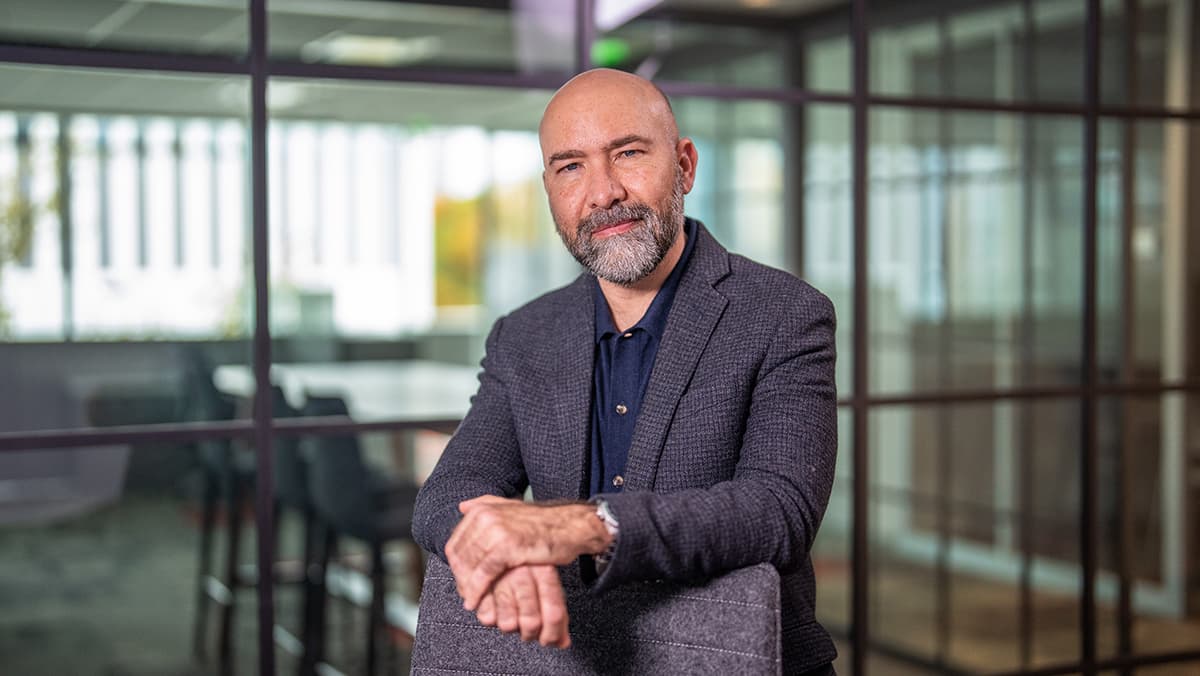
Uncovering the Potential of Targeting the CD38 Pathway for Immune-Mediated Diseases
Since 2023, Biogen has worked to transform its portfolio, building upon its legacy in multiple sclerosis and neuroscience to expand in immunology and rare diseases, where the company has well-established global development commercialization capabilities. A key catalyst: the 2024 acquisition of HI-Bio, bringing new depth to Biogen’s R&D efforts in immune-mediated conditions, which now includes rare kidney diseases. While HI-Bio brought nephrology expertise, the path to treatment goes through the immune system, and that’s where Biogen sees long-term potential. With investigational programs now underway in three rare kidney diseases and a differentiated approach to CD38-targeted therapies, Biogen is entering its next chapter.
In this Q&A, Dr. Uptal Patel, who joined Biogen through the HI-Bio acquisition and now leads development at the company’s West Coast Hub, shares what’s next for its investigational anti-CD38 antibody, and why immune targeting is opening up potential new possibilities in nephrology.
Q&A
- What drove your personal interest in kidney disease? What did you hear from patients?
When I was in residency training, I had the chance to meet several patients who had kidney disease. I was impressed by their stories of resilience and how they adapted to their challenges with kidney failure – having been either a recipient of a kidney transplant or undergoing hemodialysis as a treatment for kidney failure. I saw the power of second chances. Kidney disease is unique in that it has these lifesaving treatments for organ failure.
But patients often asked me why I didn’t have better treatments for them to prevent kidney failure rather than managing it with dialysis or transplantation. As a specialty, we often borrowed therapies from cardiology and rheumatology but we hadn’t really developed therapies that prevented progression for people with kidney disease. Because of that, I started doing translational work to identify better biomarkers that could be used in clinical trials, working with sponsors while I was in academia, enrolling patients in studies, and being part of steering committees for trials.
What I found, however, was that it was often hard to influence decisions that biopharma companies were making from the outside, so when I got the chance to build a program focused on kidney disease at Gilead in the inflammation therapeutic area, I saw it as a tremendous opportunity. The immune pathways, whether autoimmune or inflammatory, were some of the most promising mechanisms that I saw could be targeted with the goal of improving longer-term outcomes in people with kidney disease, and there really hadn’t been a focused effort in developing those therapies. I’m now grateful to be able to continue that work at Biogen.
- In your work at Biogen, you are developing potential treatments that target a protein called CD38. What is the advantage to targeting CD38 that this approach could have for immune-mediated diseases?
There are multiple diseases caused by autoantibodies that attack the body’s tissues. While the organs affected vary, the mechanisms that underlie these diseases are shared. Most autoantibodies are generated by two types of cells, plasma blasts and long-lived plasma cells. Both of these cell types, which are our bodies’ professional antibody factories, have high surface expression of CD38, which makes it a very interesting target for treating antibody-driven immune diseases.
The mechanism by which anti-CD38 therapy works is by directly depleting these cells that produce autoantibodies. We believe this has the potential to treat immune-mediated diseases in a more durable and targeted way. At the same time, critically, we avoid depleting early lineage B-cells, and this has the potential to provide a differentiated safety profile allowing patients to mount an immune response and retain immunity from vaccines, for example.
- What makes Biogen’s approach to targeting CD38 novel?
Our asset targeting CD38 has been shown in early, small clinical studies to selectively deplete CD38+ cells, including plasma cells and natural killer, or NK, cells. It is hypothesized to have a safety profile that may be more appropriate for long-term use in immune-mediated diseases for three important reasons.
First, initial clinical studies have shown that the drug under development binds to CD38 and depletes CD38 expressing cells in a manner that doesn’t involve complement-dependent cytotoxicity, a process that can lead to more inflammation and severe infusion reactions. Secondly, it also has long-term preclinical safety data, which show that it was generally well-tolerated in chronic and reproductive toxicity studies in animals. Finally, it is thought to bind in a way that does not inhibit CD38’s ectoenzyme activity which may also reduce on-target adverse events.
Based on these characteristics, the investigational drug candidate has shown scientific viability in antibody mediated rejection (AMR), IgA nephropathy (IgAN) and primary membranous nephropathy (PMN), and we’re investigating its potential in three Phase 3 pivotal studies, all of which have already been initiated.

Juan Carlos, a Biogen employee, is a recipient of a kidney transplant.
- And how does this work apply to your experience treating nephrology patients? When you realized there was application of CD38 to nephrology, how did you decide which diseases to target?
We’ve focused on developing treatments for three rare kidney diseases with significant unmet need, including antibody mediated rejection (AMR) in kidney transplant, a leading cause of kidney transplant loss; IgA nephropathy (IgAN), a leading cause of kidney failure; and primary membranous nephropathy (PMN), a severe antibody-mediated disease of the kidney that is a leading cause of nephrotic syndrome and carries a significant risk of kidney failure.
We have the opportunity to potentially provide either the first or a new, differentiated treatment for each of these diseases in the future, which aligns with our strategy to pursue potential breakthroughs for patients.
- How important was Biogen’s expertise in getting treatments for rare diseases to patients when HI-Bio when deciding on the preferred partner for an acquisition?
Biogen’s deep expertise commercializing rare disease treatments was a key differentiator for us. Bringing innovation to patients means that a market often must be developed since there has been no treatment until that point. This is something Biogen has done, with great success, in spinal muscular atrophy (SMA) and Friedrich ataxia (FA).
We saw that Biogen had capabilities to not only bring a drug through development to approval but, most importantly, how to effectively get it to patients once it is approved. The company has the geographic scope and patient support expertise in place based on experience with treatments for SMA (which is now available in more than 70 countries) and for Friedrich ataxia (which is available in more than 40 countries and growing). We’ll now be able to apply that same expertise and key learnings to rare kidney diseases, if successful.

Nichole is a recipient of two kidney transplants.
- Finally, Biogen has stated its intention to expand into immunology, which is a broad and crowded space. How are you choosing where to focus?
Broadly, when we decide to enter any new area, we look for opportunities where there are scientific breakthroughs that offer the chance to bring forward advances in areas of significant unmet need. We also want to ensure we have a clear understanding of the disease biology, as well as the pathway to target. In this instance, targeting CD38 is a well-known approach to selective B-cell depletion that a growing number of clinicians are familiar with (and has origins in oncology) but we’ve applied here to immune-mediated kidney diseases.
When it comes to immunology, it’s also important to remember that Biogen has a deep legacy in multiple sclerosis, an autoimmune disease which affects the central nervous system. Together with the expertise from the team at HI-Bio, we have experience across many immune pathways, so it’s a natural place for Biogen to continue expanding its pipeline.